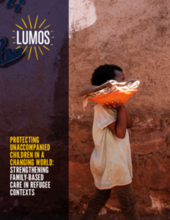In 2018-2020, Lumos worked with partners across four refugee camps in Tigray, Ethiopia. The goal was to reverse the trend of placing unaccompanied children into institutions, bringing in a system that put family-based care first.
Lumos set up processes for recruiting, screening and training potential foster carers, then supporting them – financially, practically and emotionally – once children were placed with them.
Out of the project came these active principles that they hope can be applied to care transformation in other refugee settings:
- Make family-based care the first option. Design systems around this, making institutional options the last resort.
- Create strong processes and systems. A co-ordinated, formal temporary foster care service is essential, with rigorous selection and training and cash-based help.
- Invest in people not institutions. Make sure staff can run your strong services and systems, training and developing and passing their knowledge on to foster families and communities – as well as on to the next staff member.
This evaluation report considers the various components of the project and provides recommendations to child protection and refugee response practitioners, with the aim of improving the quality of child protection programming and its impact on unaccompanied children in refugee contexts.
The authors hope that the achievements, lessons learned, and recommendations in this report will provide insights that will enable the establishment or strengthening of family-based care for unaccompanied children in other refugee contexts.
With carefully directed funding and programming, future emergency or crisis responses could implement family-based care systems as the first response, without defaulting to institutional facilities.

